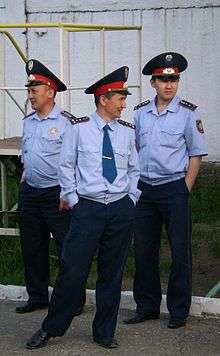Law enforcement in Kazakhstan
Law enforcement in Kazakhstan is handled by the Kazakhstan police and law courts, largely unchanged from the era of Soviet control, and is shared between the country's National Security Committee, Ministry of Internal Affairs and the Office of the Procurator General.

Organisation
The police force itself comes under the jurisdiction of the Ministry of Internal Affairs, whereas the National Security Committee and the Procurator General's office are responsibly for intelligence gathering and investigation respectively. From 1992 Kazakhstan became a member of INTERPOL. Its law enforcement agencies are closely tied with those of Russia, Belarus, Uzbekistan, Ukraine, and Kyrgyzstan.
The court system in Kazakhstan operates at three levels, local, province, and supreme court, and operates under a system of guaranteed legal representation (similar to that of the United States of America).
There are reasons to believe that the police force is indeed corrupt as they are not paid well and they need another way of making money. As the government is corrupt the law enforcement agencies could highly be corrupt as well.
Human rights allegations
The website of the US Embassy in Kazakhstan notes that in 2004-2005 the Kazakhstan government's human-rights record "remained poor," and "the Government continued to commit numerous abuses."[1] Observer group Freedom House ranks this former Soviet state with a 6 in Political Rights and a 5 in Civil Liberties (scale of 1-7; 1 is the highest), denoting it as "Not Free." Political expression was reported to be restricted in Kazakhstan in the months leading up to presidential elections in December, according to observers, including Human Rights Watch and Freedom House.[2]
The CIA world fact book cites that out of 76,000 prisoners interred in Kazakhstan prisons, 1,300 died of tuberculosis in 1995, and the prisons themselves suffer from overcrowding and staff shortages.[3] Government funding for the prison system is also seen to be inadequate.[3]
Crime rates
Kazakhstan has suffered from growing crime rates in recent years, and the police force is viewed as being understaffed and inefficient, with a rate of 50 crimes per 10,000 population being cited, most commonly violent crime and narcotics, (cannabis and opium in particular, it is estimated that there are 1,380 km² of cannabis plantation).[3] The police are also reportedly understaffed, in some cases by as much as 2000 officers.[3]
References
- "Supporting Human Rights and Democracy, Kazakhstan". Usembassy.kz. Retrieved 16 August 2018.
- "Freedom House". freedomhouse.org. Retrieved 16 August 2018.
- Report of the USA CIA World Fact Books, the United Nations Statistical Office